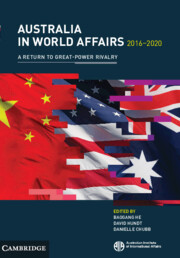Description
As a middle power that possesses limited capacity to impose its will on other states, Australia has beneftted greatly from the international rules-based order. But that order is looking incredibly fragile, threatened by growing geopolitical competition and economic changes. Australia and the Rules-Based International Order brings together leading scholars and practitioners in the field of international relations to investigate the meaning behind the idea of rules-based order, its role in Australia’s foreign policy, and Australia’s contribution to its development. Understanding the importance of this order and Australia’s experience in helping to shape it, the authors of this collection lay a vital foundation for comprehending what Australia needs to do to preserve its most important elements in this changing period.
A free version is also available online.




